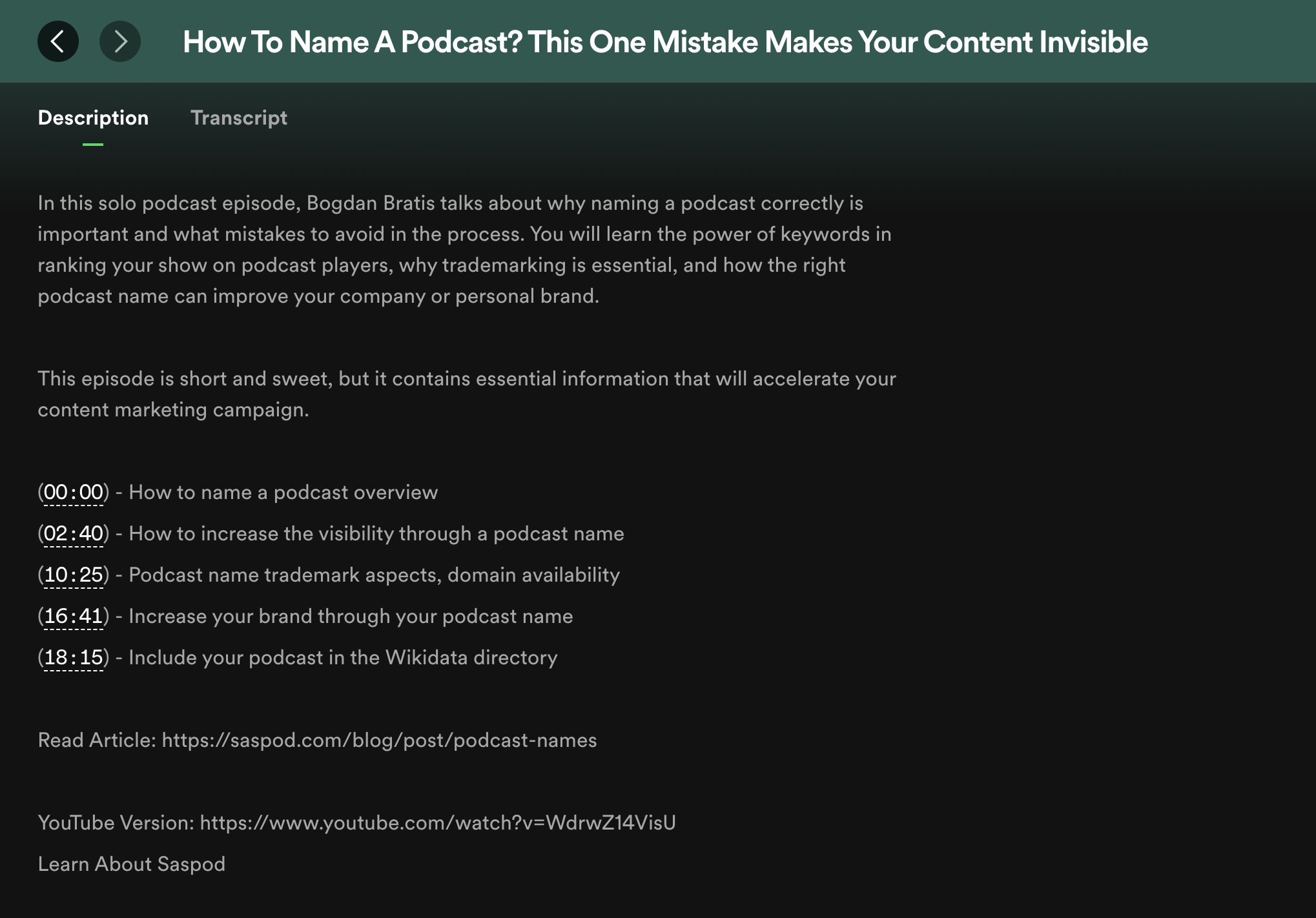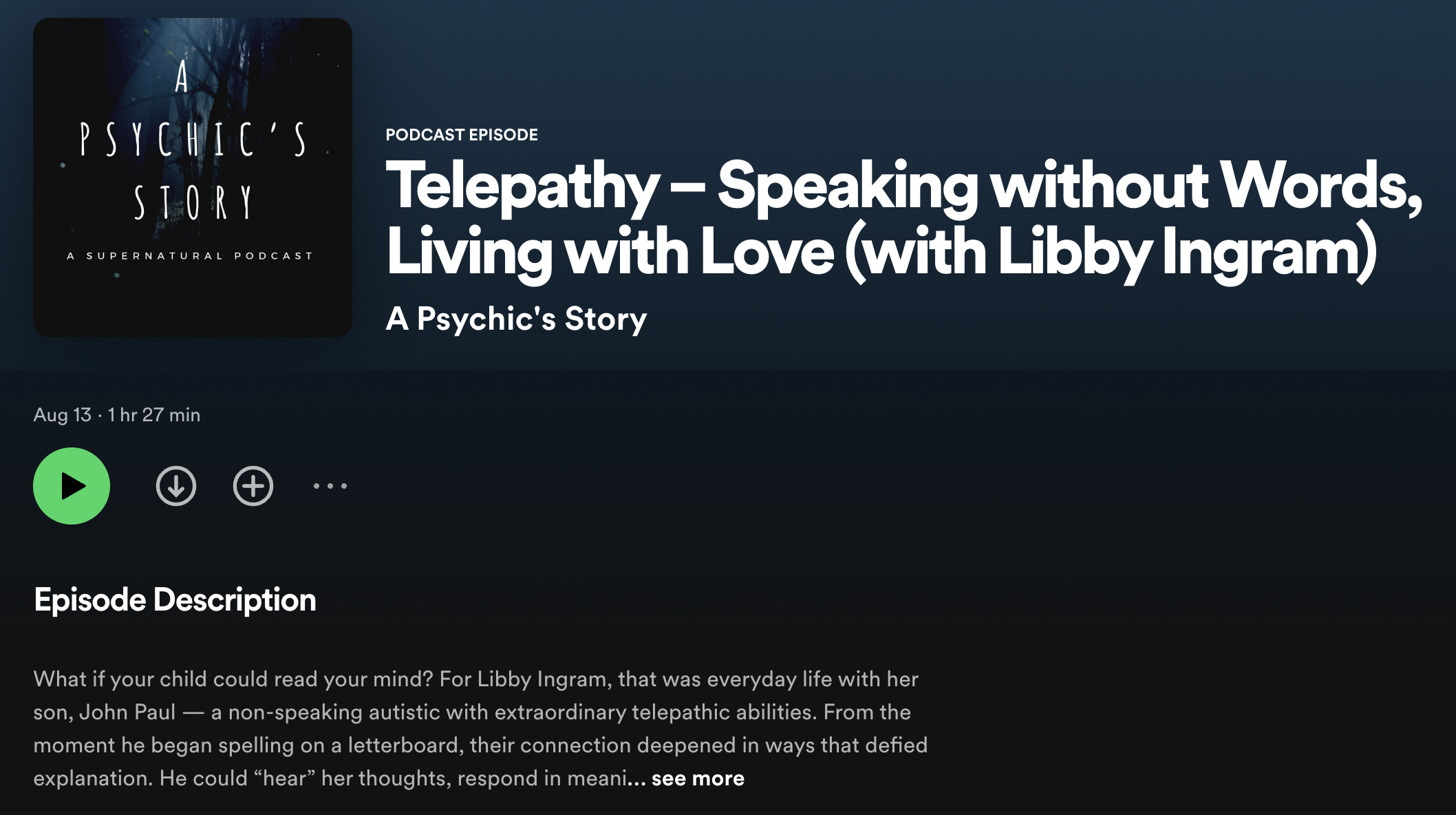Podcast show notes are one of the most powerful tools for growing your podcast audience, improving SEO, and creating a better listener experience. So, why is it that show notes are often treated as an afterthought?
If you’re publishing episodes without strong show notes, you’re leaving traffic, engagement, and conversions on the table.
In this podcast show notes guide, we’ll cover:
- What are podcast show notes?
- Why are podcast show notes important?
- A step-by-step process for writing them
- SEO tips to make them rank on Google
- Real examples and free templates you can start using today
Ready to start creating the best show notes possibly? Let’s dive in!
What Are Podcast Show Notes?
Podcast show notes are a written summary of your podcast episode. They are typically published on your website and alongside your episode on podcast directories.
Look at this episode from The Pod Files as an example:

Good podcast show notes include:
- A short description of the episode
- Key topics covered
- Guest details (if relevant)
- Links to resources mentioned
- Calls-to-action (CTAs)
Think of your podcast show notes as a companion guide for your listeners. They help people decide whether to listen, find the resources you mentioned, and even share your episode.
Show notes can be educational, storytelling, or simply sharing the essentials.
It’s important to mention that show notes are different from your podcast description. The podcast description refers to the whole show and is a summary of your entire podcast. Show notes are specific to each individual episode.
Why Are Podcast Show Notes Important?
Strong show notes are a small effort with big payoffs. Here’s why show notes are so important:
1. Improve Listener Experience
Listeners don’t always have time to listen to an entire episode. Show notes can help them:
- Scan key points quickly
- Jump to sections using timestamps
- Access links and resources mentioned in the episode
The convenience of show notes makes your podcast more user-friendly, allowing listeners to return to and share valuable content.
Think of podcast show notes like the Cliffnotes of podcasting!
2. Boost Podcast SEO (Search Engine Optimization)
Google can’t “hear” your audio, but it reads your text. When you add keyword-rich show notes, you make your episodes discoverable in search results.
For example, if you host a podcast about fitness, show notes optimized for “beginner workout tips” could bring organic traffic to your site from people searching for that term.
Utilizing SEO in podcasting is a key step in an effective podcast marketing strategy. But we totally understand that this can be confusing to some people. That’s why the best podcast agencies, like us, offer assistance and services to help lighten your workload!
3. Drive Engagement and Conversions
Show notes are the perfect place to include CTAs such as:
- “Subscribe to the podcast!”
- “Sign up for our newsletter!”
- “Join our community!”
- “Check out our products or services!”
Every episode becomes an opportunity to convert a listener into a subscriber or customer.
Essential Elements of Great Podcast Show Notes
Now that you know what podcast show notes are and why you should use them, you need to understand the essential elements to make them great.
Here’s what to include for maximum impact:
1. A Solid Episode Title
Your episode title is one of the first aspects listeners will see and read. The title needs to be a hook, line, and sinker.
To nail your episode title, think about being:
- Clear and descriptive – so people know what the episode is about
- Keyword-friendly – for search visibility
- Intriguing – to encourage clicks and listens
For example: Instead of “Episode 12: Marketing”, try “10 Proven Social Media Marketing Tips to Grow Your Brand in 2025”. This episode title gives listeners a clear understanding of what to expect, weaves in a strong keyword, and taps into intrigue.
The episode title is in effect the title of your show notes.
2. Engaging Episode Summary
Start with 2–3 sentences that hook the reader right away. Highlight the value they’ll get from listening to your episode. But remember to keep it straight, shooting, and to the point.
Take one of the most recent episodes from The Pod Files:
“In this episode of The Pod Files, host Bogdan Bratis sits down with podcasting industry veteran James Cridland, the editor of Podnews and a leading radio futurologist. James shares insights from his impressive career, including launching the world's first streaming radio mobile app and advising major broadcasters like the BBC and ABC Australia.”
Take a look at the full episode and complete podcast show notes to get an idea:
3. Timestamps (Optional But Powerful)
Adding timestamps to your podcast show notes lets listeners skip to sections they care about. It’s great for listeners who want to go back and replay key sections or even those who haven’t got time to listen through all the content.
Here’s a good example:

Think of the timestamps as chapter titles for your episode. Who doesn’t love a clear outline?
4. Guest Information
If you host podcast guests, then be sure to share the guests' information with your listeners. Include their bio, website, and social handles. This gives your guest value and helps listeners connect with them, building the networking web of your podcast!
Does your guest have a book they’re promoting? Add relevant links to your podcast show notes too.
5. Links to Resources
Following on from linking to your guest’s books, always make sure you link to other resources referenced in the episode, especially if these resources are yours. If you mention your services or articles, link to them in the show notes, every time you do these, you send links to your website content, improving ranking.
6. Transcript (Optional)
Again, transcripts are another optional extra to consider adding to your podcast show notes. Adding a transcript boosts accessibility and provides additional keyword opportunities for SEO. (The more content/words, the more opportunities for keywords being picked up by Google and other search engines.)
You don’t have to include the transcript in the main body of the show notes. Spotify allows you to add them on a separate tab, keeping the organization clean and clear. You can do the same on your podcast’s website, too!
7. Call-to-Action (CTA)
Don’t be afraid to end your podcast show notes with a clear CTA:
- Subscribe
- Leave a review
- Visit your website
- Download a free resource
CTA’s direct listeners to engage with your content further. Higher engagement means higher rankings on directories, which leads to higher listenership and potential podcast monetization opportunities.
8. SEO Optimization
SEO doesn’t have to be complicated. However, we do appreciate that for some it’s like trying to speak a foreign language. The basics of SEO are: use keywords naturally in your title headings and summary; add internal links to related episodes; and include alt text for any images.
Still feel a bit lost?
Get in touch with us to discuss how Saspod can help you with your podcast marketing needs.
How to Write Podcast Show Notes: A Step-by-Step Guide
Now you know the essentials, let’s move on to how to write podcast show notes that are actually going to add value to your show!
You don’t have to be a professional writer to get this right. However, hiring a copywriter or an agency (like us) can get the job done faster, saving you hours of work every week and ensuring your show notes are always polished, SEO-friendly, and audience-focused.
Here’s a quick outline of the steps to writing killer show notes:
- Listen to the episode
- Identify key takeaways
- Write a compelling introduction
- Add guest details and links
- Include timestamps
- Optimize for SEO
- Proofread and format
Want a little more information? Let’s go into the details.
Step 1: Listen to the Episode
Even if you recorded and edited the episode yourself, it’s essential to listen again with fresh ears. You’ll often pick up on little nuggets, memorable quotes, or “aha” moments that are perfect for highlighting in your podcast show notes.
Top Saspod Tip: Use tools like Castmagic, Descript, or Otter.ai to generate transcripts. Reading along while listening helps you quickly identify the most important sections and pull out key quotes for your notes.
Step 2: Identify Key Takeaways
Your listeners want to read through the podcast show notes and know: “What’s in it for me?”
Make a list of the most valuable insights or lessons shared in the episode. These become the backbone of your show notes. For example:
- What questions were answered?
- What tips or strategies were discussed?
- Did your guest share a powerful story or quote?
This is also where you decide which keywords to weave into your notes. If your episode is about “email marketing,” you’ll want to highlight terms like email list building, subject line tips, email strategy, etc.
Step 3: Write a Compelling Introduction
The podcast show notes introduction is the hook. It needs to answer two things:
- What is this episode about?
- Why should the listener care?
Keep it short (2–4 sentences), clear, and engaging. Avoid “In this episode, we talk about…” and instead focus on the benefits of listening.
Take this example from A Psychic’s Story:

Step 4: Add Guest Details and Links
If you are a show interviewing guests, make sure to highlight them properly. Be sure to include the following details in your podcast show notes:
- A short bio (1–2 sentences)
- Their credentials or why they’re an expert
- Links to their website, social media, or products
Not only is this professional, but it also makes guests more likely to share the episode with their audience. Leveraging your guests' platform is an effective networking tool to expand your audience and reach.
Step 5: Include Timestamps
As we mentioned in the essentials list, timestamps are optional for show notes. However, remember they do add value. Timestamps let listeners jump directly to the sections they care about, go back to relisten to important sections, and share key moments. This is especially helpful in long-form interviews.
Make sure you stay consistent when formatting timestamps for podcast show notes:
- (MM:SS) (e.g. 03:45)
- (HH:MM:SS) (e.g.1:05:30)
Place the timestamps with brief descriptions of the content at that point in the episode within the show notes. These timestamps can turn into clickable links in some podcast apps, allowing listeners to easily navigate to specific segments of the episode.
Add your timestamps in brackets; otherwise, Spotify won't make them clickable.
Here’s a good example of clear timestamps from The Pod Files episode ‘The Future of Podcasting with James Cridland’:

Timestamps also help Google index your content, especially when paired with YouTube or embedded audio players. This plays into the next step, tapping into SEO.
Step 6: Optimize for SEO
SEO is the step that takes your podcast show notes from “nice to have” to “growth tool.”
- Use keywords naturally in your title, intro, and headings.
- Link to other episodes on your site (internal linking boosts SEO).
- Add external links to resources mentioned.
- Use bullet points, numbered lists, and H2s/H3s for readability. (If your host supports this)
- Add alt text to images you include in your blog post.
Remember, SEO-friendly show notes don’t just help with discoverability. They also make your notes easier to skim and more enjoyable to read.
Step 7: Proofread and Format
Finally, double-check and proofread. Don’t be tempted to skip this step!
Use this final step to polish your podcast show notes so they’re professional and easy to digest. We advise you to break up long paragraphs, use bullet points, and check spelling.
Formatting top tips:
- Stick to short paragraphs (3–4 lines max).
- Use subheadings for sections.
- Bold key phrases or questions.
- Always include a CTA at the end: “Subscribe, review, or download our free resource.”
Podcast Show Notes vs. Podcast Description vs. Transcript
But hang on a minute. What’s the difference between podcast show notes, podcast descriptions, and transcripts? Are these all the same thing? No!
Let us clear these differences up.
|
Podcast Description
|
Overview of your entire show (seen in directories)
|
|
Podcast Show Notes
|
Detailed breakdown for each episode
|
|
Transcript
|
Word-for-word record of the episode
|
Each serves a different purpose and is a useful tool to use in podcasting. Show notes give you the most SEO and engagement benefits.
Common Podcast Show Notes Mistakes
Unfortunately, many podcasters make simple mistakes when writing show notes that are easy to avoid. Here are some of the most common show notes mistakes we see:
|
Mistake
|
Why It's A Problem
|
|
Writing just one sentence
|
Too short for SEO or engagement
|
|
Keyword stuffing
|
Makes it unreadable
|
|
Skipping CTAs
|
Missed conversion opportunity
|
|
No formatting
|
Big text blocks turn readers away
|
Free Podcast Show Notes Templates
To save you time, we’ve created 3 free show note templates you can copy and customize. Simply copy and paste the Google Doc into a new Google Doc file to make your edits.
These templates are good podcast show notes examples that you can edit and make your own.
Template 1: Quick and Simple
Perfect for short episodes and keeping words to a minimum.
👉Download your FREE Quick and Simple Show Note Template here 👈
Template 2: Long Form Expert
Made for those longer episodes that deep dive into topics with guests.
👉Download your FREE Long Form Expert Show Note Template here 👈
Template 3: Storytelling Master
Designed for those with a story to tell. Keep your listeners on track and engaged.
👉Download your FREE Storytelling Master Show Note Template here 👈
FAQs
What are show notes?
Podcast show notes are short written summaries that sit alongside your episodes. They usually include a recap, guest details, and links to resources mentioned. Think of them as a roadmap for your listeners and a way to make your podcast more searchable.
How long should podcast show notes be?
A good length is 300–600 words, which balances readability and SEO. Shorter notes work for quick episodes, while longer notes suit deep-dive interviews. Adjust the length to match the style of your show.
Do show notes help with SEO?
Yes, they make your content discoverable on Google and podcast directories. By adding keywords, links, and detailed summaries, you give search engines more to index. This can drive new listeners who may never have found your show otherwise.
Should I include transcripts in my show notes?
Including transcripts is optional, but it improves accessibility for people who prefer reading. It also creates more keyword-rich text, which boosts SEO. If you publish transcripts, make sure they’re easy to scan with headings or timestamps.
What’s the difference between show notes and an episode description?
Show notes are detailed write-ups, often hosted on your website, with summaries, links, and calls to action. Episode descriptions are shorter, usually just 1–3 sentences, and appear inside podcast apps. Think of descriptions as the “teaser” and show notes as the full resource.
Ready To Create Knock Out Podcast Show Notes?
Great podcast show notes are more than a summary. They’re a growth tool for your podcast. Show notes enhance discoverability, facilitate listener engagement, and create opportunities for conversion.
If writing show notes feels overwhelming, Saspod can help. We offer podcast show notes service as part of our full-service podcast production, so you can focus on creating amazing content.
Ready to take your podcast to the next level? Contact us today!


Comments
No comments yet!